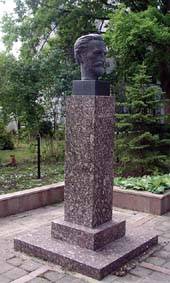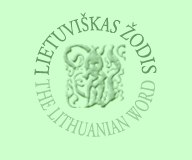-
 Liudas
VAINEIKIS (1869-1938), physician, active participant in the
Lithuanian national renaissance, born in Svirpliai, county of
Siauliai, on Aug. 19, 1869. With several interruptions, he studied
medicine at the University of Moscow beginning in 1889. For taking
part in the underground movement of Lithuanian students and for
circulating and contributing to the banned Lithuanian press, he was
expelled from the university in 1896. Nevertheless, that same year he
passed the physician's qualifying exams at the University of Kazan and
started to practice (1897-1900) in Palanga, a Lithuanian resort on the
Baltic Sea, which at that time was close to the German (Prussian) and
Russian border. Over this border he organized the stealthy traffic and
dissemination of Lithuanian books and newspapers outlawed by the
Russian government (see Press Ban). He maintained close ties with
Lithuanian socialists and Russian revolutionaries abroad and helped to
disperse their publications aimed against the tsarist regime. He was
arrested in 1900, imprisoned for two years in Liepaja (Latvia), and in
1902 exiled to Yakutsk, Eastern Siberia. Released during the
revolution of 1905, he returned to Palanga. For several years he was
active in the Social Democratic party, assisting in the editing of its
Darbininkų Balsas (The Workers' Voice) published in Tilžė
(Tilsit). He spent the years 1915-20 practicing medicine in Central
Asia. From 1921 he again lived in Palanga, where alongside his
physician's duties he concerned himself with the resort's social,
economic, and cultural affairs; in 1928 he was officially appointed
physician of the resort. He died in Kaunas on Jan. 17, 1938. Liudas
VAINEIKIS (1869-1938), physician, active participant in the
Lithuanian national renaissance, born in Svirpliai, county of
Siauliai, on Aug. 19, 1869. With several interruptions, he studied
medicine at the University of Moscow beginning in 1889. For taking
part in the underground movement of Lithuanian students and for
circulating and contributing to the banned Lithuanian press, he was
expelled from the university in 1896. Nevertheless, that same year he
passed the physician's qualifying exams at the University of Kazan and
started to practice (1897-1900) in Palanga, a Lithuanian resort on the
Baltic Sea, which at that time was close to the German (Prussian) and
Russian border. Over this border he organized the stealthy traffic and
dissemination of Lithuanian books and newspapers outlawed by the
Russian government (see Press Ban). He maintained close ties with
Lithuanian socialists and Russian revolutionaries abroad and helped to
disperse their publications aimed against the tsarist regime. He was
arrested in 1900, imprisoned for two years in Liepaja (Latvia), and in
1902 exiled to Yakutsk, Eastern Siberia. Released during the
revolution of 1905, he returned to Palanga. For several years he was
active in the Social Democratic party, assisting in the editing of its
Darbininkų Balsas (The Workers' Voice) published in Tilžė
(Tilsit). He spent the years 1915-20 practicing medicine in Central
Asia. From 1921 he again lived in Palanga, where alongside his
physician's duties he concerned himself with the resort's social,
economic, and cultural affairs; in 1928 he was officially appointed
physician of the resort. He died in Kaunas on Jan. 17, 1938.
-
- Bibl.: S. Kairys, Lietuva
budo. New York, 1957; S. Vaineikienė. Iš praeities kovų,
3 volumes, Kaunas, 1935-1936.
-
Text from the ENCYCLOPEDIA
LITUANICA I-VI. Boston, 1970-1978
-
-
|

